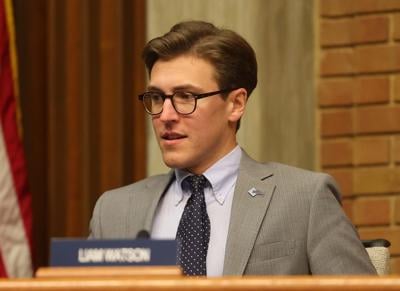Shortly before 10 on the morning of June 28, 2024, there was a knock on the door of Liam Watson’s Blacksburg house.
Still wearing pajamas, Watson greeted two law enforcement officers and invited them inside. In the living room, he was told that the Virginia State Police special agent and the U.S. Postal Service inspector were there to talk about the Blacksburg Town Council election, which Watson had won the previous November as a write-in candidate.
“The purpose of the interview was to see if Watson lived on Milhurst Street in the town of Blacksburg, as he claimed, during his run for Town Council,” court records state.
Watson had listed 502 Milhurst on election paperwork, which is required by state law to show that someone actually lives in the jurisdiction they seek to represent. Watson stuck to his story through 40 minutes of interrogation.
People are also reading…
Then Special Agent Shane Clifton dropped a bombshell: Utility records obtained through a search warrant “showed zero electric usage for three of the months he claimed to live at Milhurst,” prosecutors would later write in court papers.
“Watson immediately stated he wanted to consult an attorney prior to answering any further questions,” the document states.
The following month, a grand jury indicted Watson, 25, on four counts of election fraud. His lawyer filed motions in December asking a judge to suppress both the statement and the search warrant, arguing they were unlawfully obtained.
On Monday, Montgomery County Circuit Judge Robert Turk denied both motions and set a trial date of July 14-15.
Ever since Watson was elected in November 2023 — becoming what is believed to be the youngest person to sit on the Town Council — rumors have swirled about the circumstance of his candidacy.
Three citizens filed a complaint that reached the desk of Commonwealth’s Attorney Mary Pettitt, alleging that Watson was living with his parents in Montgomery County when he filed paperwork establishing his residency as Blacksburg.
Pettitt asked state police to request authorization from Virginia’s Attorney General to begin an investigation, which was granted in March 2024.
Clifton confirmed though land records some of what the citizens said. He also learned that the county voter registrar had sent Watson a letter to the Milhurst address that was returned with a handwritten note that read “VACANT.”
And Watson never changed his mailing address with the U.S. Postal Service or the Department of Motor Vehicles during the seven months he said he lived at Milhurst, according to court records.
Watson is charged with election fraud for listing the address on three documents: a voter registration application submitted in August 2023, a statement of candidate committee organization filed later that month, and a declaration of candidacy made in November.
A fourth charge alleges that he voted illegally in the municipal election.
After the charges were filed, Watson declined a request by his fellow council members to step down while the case is pending. “I look forward to continuing my representation of the people of the Town of Blacksburg,” he wrote in a response.
Watson, who lived in Richmond shortly before he began his campaign, listed at least three different Blacksburg addresses in paperwork filed with election officials.
By the time police showed up at his doorstep, he had moved again to Progress Street in Blacksburg.
Allegations that Watson falsified his address to qualify as a candidate came as no shock to him. “This was not a surprise to Watson as he responded ‘that was a common theme during the campaign’ and ‘that’s not news to me,” Chief Deputy Commonwealth’s Attorney Patrick Jensen wrote in court papers.
But what he didn’t know was that police had obtained search warrants for records from Virginia Tech Electric Service, which provides service to Blacksburg.
In a motion seeking to have the search warrant suppressed, defense attorney John Fishwick wrote that his client had a reasonable expectation of privacy to the records. Turk denied that motion and a second one to throw out a search warrant for telephone records, which Jensen argued was based on sufficient probable cause.
Fishwick also asked that the charges be dismissed on the grounds that state police began their investigation before it was authorized by the attorney general, a requirement of state law intended to shield elected officials from frivolous allegations.
Jensen countered that Clifton conducted a preliminary inquiry to obtain some information so the Attorney General could make an informed decision, and that the formal investigation did not begin until it was authorized.
Turk agreed, saying that dismissal of the charges would be a “drastic measure” that was not supported by the facts of the case.


















